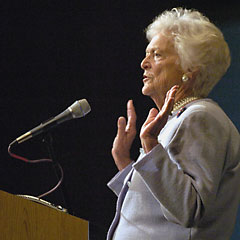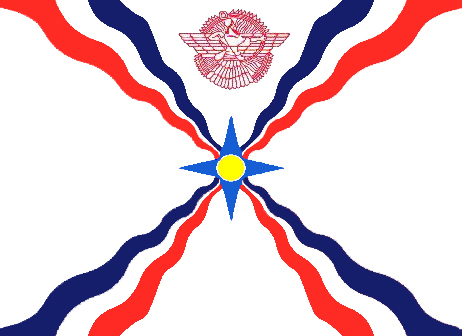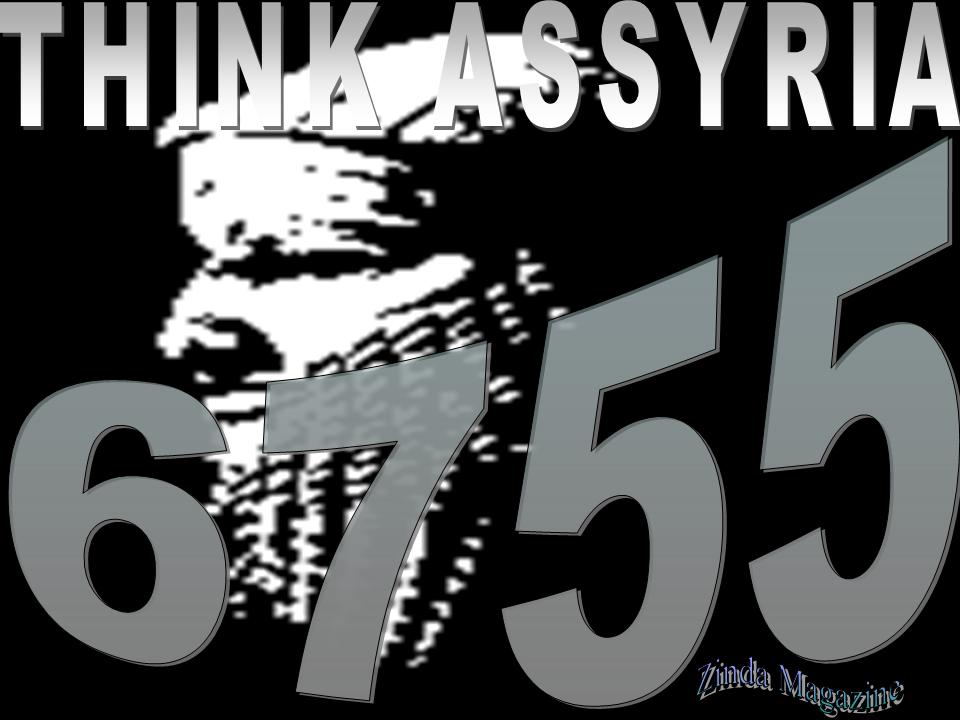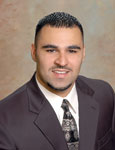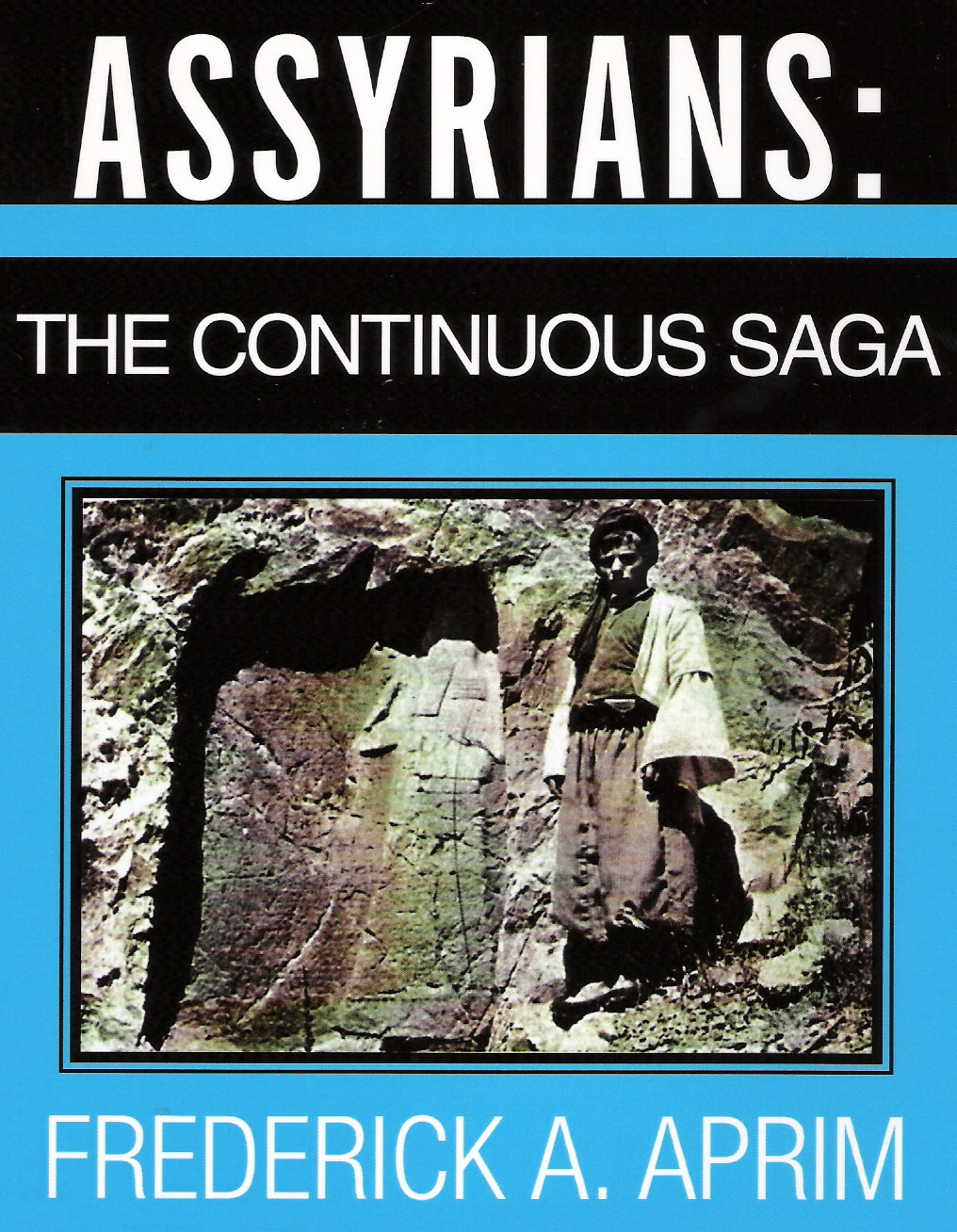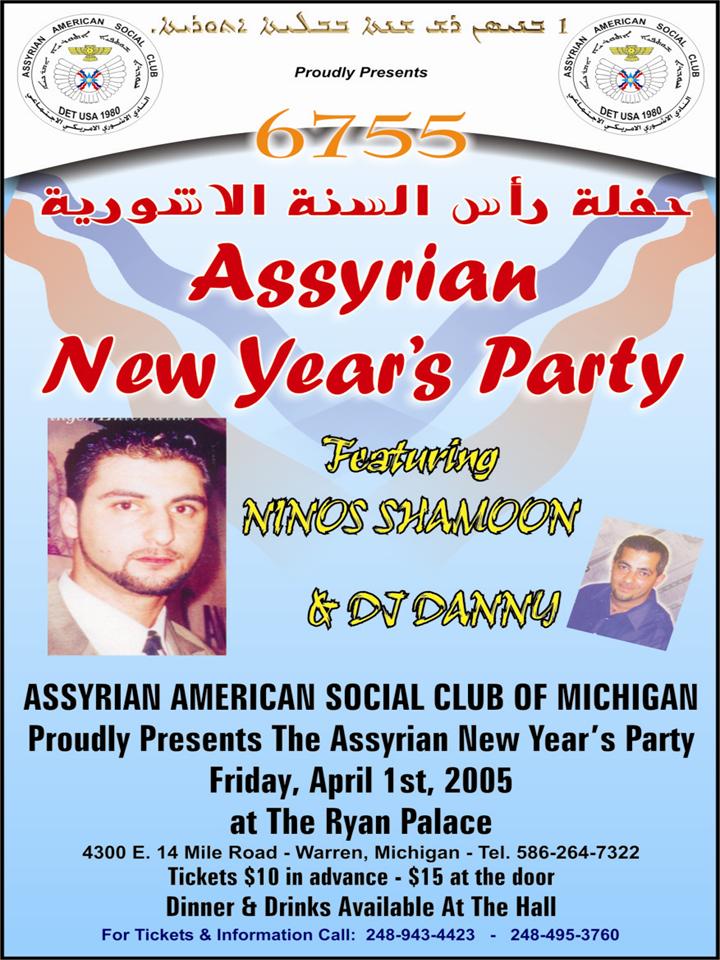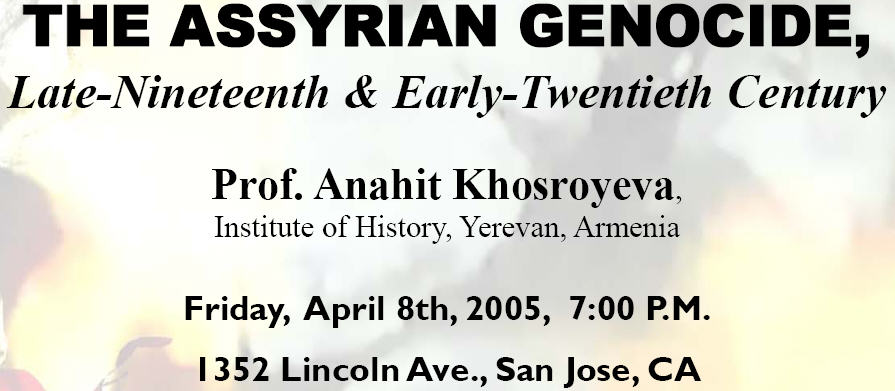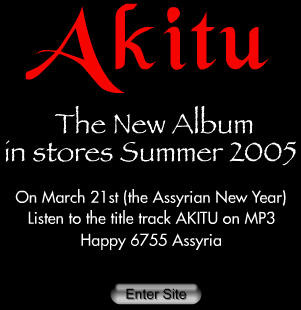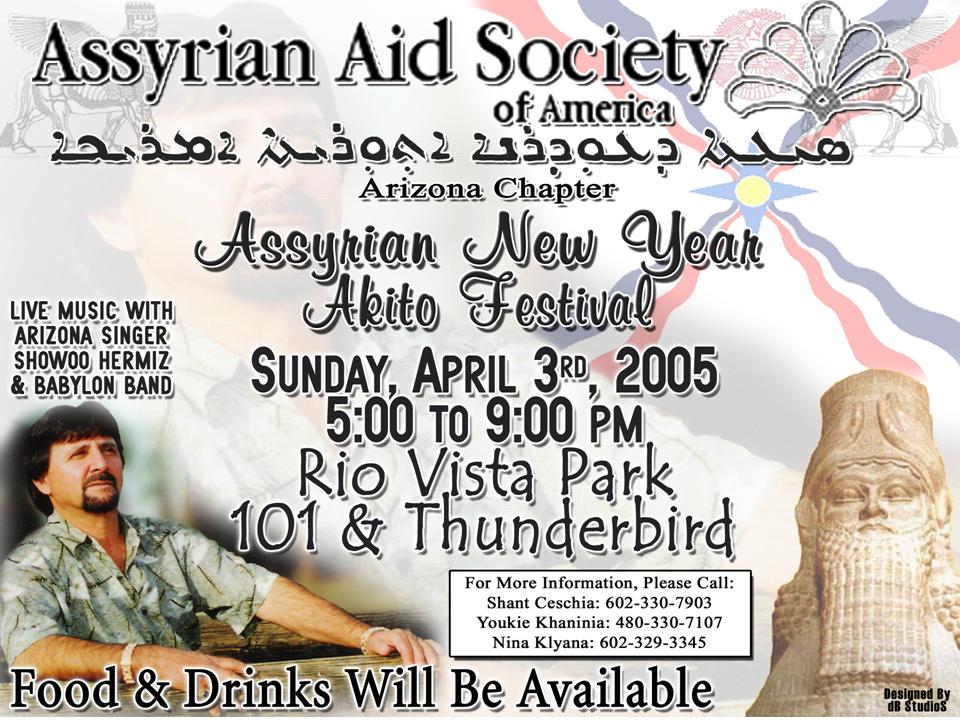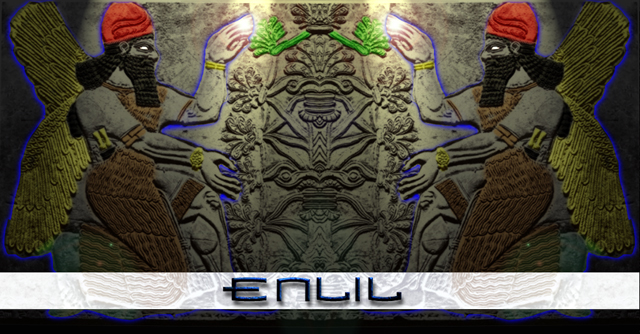The Assyrian Nation: Scattered But Alive
Rabin Bet-Khoodoo
Canada
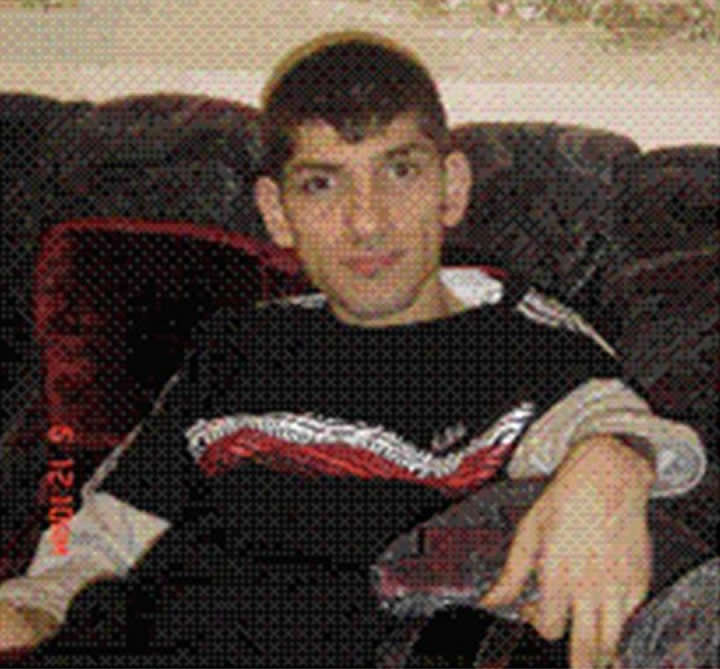 |
Rabin Bet-Khoodoo, Toronto, Canada |
My name is Rabin Bet-Khoodoo, an Assyrian from Iran who’s living now in Canada; I’m writing this article to tell you about my life in Iran and my Assyrian heritage.
I was born in Tehran city in 1979, with a physical disability that was a spastic quad cerebral palsy, and during my childhood, I couldn't go to school in Iran, because they didn't have schools for people with disabilities, that’s why I could never I couldn't communicate with people, even with my family. When I was 4 years old I watched a movie about a woman who did not have any arms. She used to do everything with her feet. That's when I got the idea to use my feet for some things. My parents used to yell at me "Don't use your feet! You have arms. Use them!" I didn't listen to my parents. I used my toe to type because it was very fast and comfortable for me.
My younger sister was able to study and go to school. I used to watch her doing her homework. One day, using my toes, I wrote the word “water” on the floor. My parents were very surprised and happy to see this, so my father decided to leave the country, he left his job as a mould maker, because he wanted to take me to any western country so I could have a better chance at an education, and so that I might get better physically. We moved to Turkey first and we thought we could go to the USA in three months. Unfortunately, we stayed in Turkey for two years because Turkey's government told us that USA didn't need any more people. We were very disappointed, after they told us that Canada wants people and we went to the hospital for a check-up. The nurse asked my parents, "How do you know that your son is smart?" My father told the nurse, "My son knows how to play dominoes." they asked him to bring the dominoes the next day so that they could see me play. They told us that if we could prove I could play the domino game that they would let us go to Canada but if I couldn't play then we couldn't go. We agreed. The next day we went to the hospital and brought the nurses and the doctors to watch us play. I played with all my heart and I was able to beat my father five times. They were all very pleased to see that I was capable of counting and thinking for myself. It was at that time that they approved us to move to Canada. We arrived here in July/1989.
I am so glad here in Canada to have the opportunity to communicate with my family and friends. I use a device called a Dynavox. This is a machine that I can use to speak by typing on it like a keyboard with my toe. The Dynavox has a voice that speaks what I type to the people that I am talking to. My Dynavox has 21 different files for different words that I use often, for example, my address is in one file. For a few months I was embarrassed because I used my foot to talk to people, especially when I went out to the mall. My teacher told me "don't be embarrassed." I finished high school and I got my diploma, unfortunately I’m still disabled physically but thank God I’m very able to serve my nation as much as I can.
Why This Article?
Just recently I went to camp to meet other Dynavox users as well as the people who make the device. I showed other people my Dynavox. Someone heard my parents talking to me and he asked: "What language do your parents speak?" I told him that my parents speak Assyrian Aramaic. He was surprised; he said that the Assyrian Aramaic language was dead and Assyrians don’t exist! … I was hurt; I said: “No, this language is still used by Assyrians in every corner of the world”. That’s when I got the idea to write a research about our history and customs, so that the next time no body will be surprised when I’ll say I’m Assyrian and my language is Assyrian Aramaic. And this article is dedicated mainly for the non Assyrian readers to, telling them that the Assyrian nation is scattered, but alive!
* * * * * *
Long before Jesus came, Assyrians built the first civilization in the history; invented many things for the humanity such as: first alphabets (Cuneiform), glass, calendars and time, mathematics, iron, wheels, ships, bitumen, tar, sewer pipes and much more. Also Assyrians had great respect for women, and many famous personalities were women, such as our great queen Shammiram (known by Greeks as “Semiramis”).
In 612 B.C was the falling of the Assyrian empire, many Assyrians fled the plains to the north of Assyria (Today's Turkey) and they kept their traditions but a considerable part stayed in Assyrian plains around the capital Nineveh, who are today known as "Chaldeans" after they joined Catholicism in the middle of 19th century, and also many in the south of Turkey who are known today as Syrian Orthodox.
After the coming of Jesus, the Assyrian nation was the first who adopted Christianity and Assyrians established universities in Nesibis and Edessa in today's Turkey. They taught philosophy for the Arabs, Greeks and Assyrians and many people from all nations, and translated the Greek philosophy and science to Arabic and passed it to the Arab caliphs during the Islam eras, in the 15th century the Ottoman empire was established on the Assyrian, Greek and Armenian land, and the Ottomans brought the Kurds from outside to help them fighting against Iran, Kurds stayed in the region and dominated the Assyrian homeland.
New History
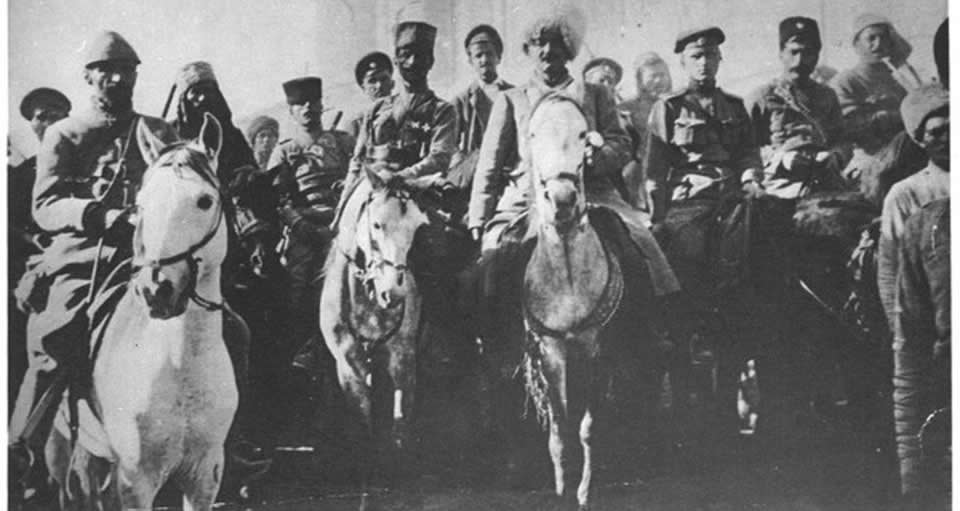 |
Assyrian forces that defended the innocent during the exodus of the Assyrian nation in the First World War - 1918 |
Assyrian Exodus: In the last century (20th or earlier) the Assyrians were forced by the Kurds and Turks to leave their homeland. A majority of these migrations took place in Assyrian mountains and surrounding areas where 2/3 of the Assyrian nation at that time (About 600.000 martyrs) was put to death during the First World War. And also our great hero the patriarch Mar Binyamin Shimon was killed by a Kurdish leader in 1918, who invited our patriarch for a peace agreement between Kurds and Assyrians.
During this war (1914-1918) the allies created a small Assyrian army to help them in the Caucasian region and also to help in protecting the Assyrians who lived in Turkey and Iran. Agha Petros, who was the counselor of Turkey in Iran, was appointed by the Mar Shimmon family to be a leader for this army beside David Bet-Mar Shimmon. After the end of the war the British never achieved their promise of delivering a homeland to the Assyrians and Agha Petros was sent to France where he died, he was a great Assyrian hero who fought for the name of Assyria.
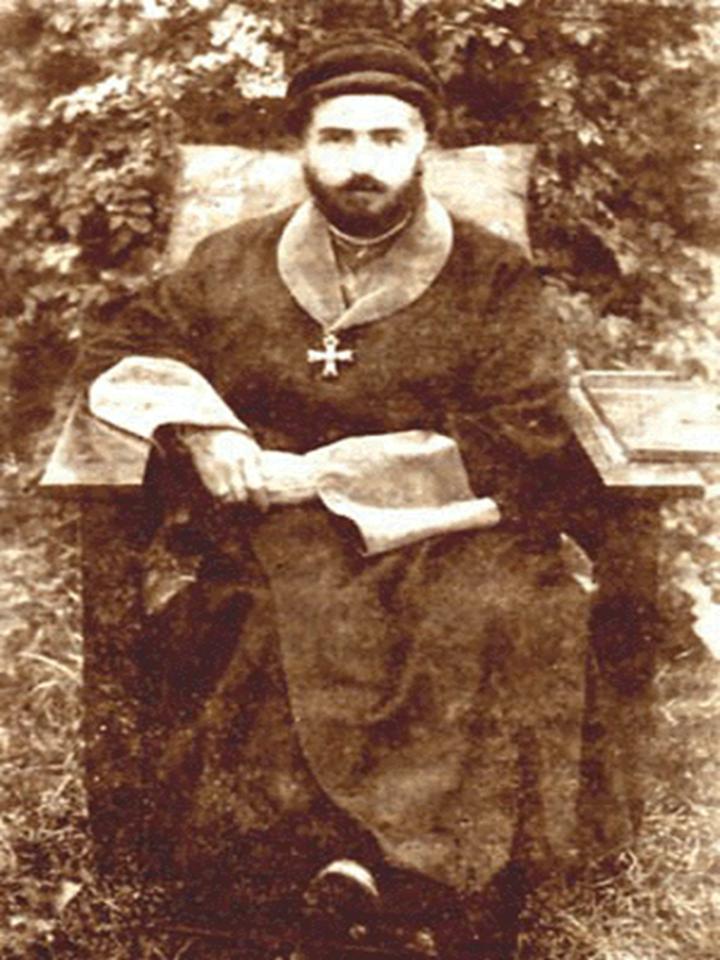 |
The martyred Patriarch Mar Binyamin Shimon |
Back to the plains: At the end of WW1 (1918), the Assyrian highlanders and the Assyrians of Iran came to the Assyrian plains (Today’s North Iraq), and they settled around their old capital Nineveh, but this disturbed the Muslims who attacked the Assyrian refugees camps in 1920 and many troubles began between Assyrians and Arabs and that ended with a massacre for the Assyrians in August -1933 when 4000 innocent Assyrians were killed in the poor villages in north Iraq and then a big part was exiled to the western Assyrian plains (Khabur in today’s Syria), where they are still.
World War II : A big part of the Assyrian nation stayed in Iraq, and Assyrians joined the allies for the 2nd time in WW2 and saved Iraq from the Nazis in 1941 when they battled with the Iraqi army under the leadership of Rashid Al-Guelani who massacred their compatriots in 1933, and who was dealing with the Germans to occupy Iraq, and by this Japan was getting ready to expand its military existence in the region and its fleet was distributed in the Indian Ocean to the borders of the Persian Gulf, but the Assyrian victory in that battle in Habbania and Ramadi and Falluja (the middle of Iraq) saved the middle east from the axis countries and by this, the Assyrians saved the WW2 for the allies, and this is attested by the British officers who served in the RAF in Iraq, and also this was discussed in the first conference of the UN in New York after a letter was sent by the late patriarch Mar Ishay Shimon (Mar Binyamin’s nephew) detailing the achievements of the Assyrian people in spite its long and long calamities, but later the case was abandoned by the UN, the most powerful international organization.
All this didn’t come with any benefit for the Assyrians, also the world did never care about the heavy burdens of the little Assyrian nation who faced the marginalization and the cultural and political persecution during the 60s and 70s in Iraq. Till the falling of the Baath regime in April-2003, for it was forbidden to the Assyrians to mention the term “Assyrian” because they were forced to Arabism, and later in 1990s they were marginalized and persecuted by the Kurds also.
Even after the English left Iraq, the Assyrians were forced to leave their homeland; a majority of these migrations took place during the 1st and 2nd and 3rd gulf wars. During these fights, the Assyrian people walked to different countries. They brought their children with them. The children were cold and hungry. Our people walked through the mountains, which were covered by snow. Some families didn't make it. Many went to Iran. Some went to Turkey and some others were lucky and went to Europe, America, Canada and Australia. We were spread all over the world, we learned their laws and language, but we still maintain our customs. Never have we forgotten our customs and our national Assyrian language.
But Assyrians are facing many difficult problems in unifying because they are divided to many religious sects, and the theological ideologies caused many disputes among our churches, that’s why we have a name problem while in fact we are many churches (Syrian, Chaldean, Church of The East) belonging to one Assyrian nation, and this name was given from God so no body can marginalize or minimize it…
 |
The Assyrian Levies during WWII who saved Iraq from the Nazis. |
Assyrian Political Parties
“The Assyrian Democratic Organization” (ADO), established in 1957 played a great role in awakening the Assyrian people for the nationalism and today it’s active in Syria and Europe.
“The Assyrian Universal Alliance” (AUA), established in 1968, started a considerable political activism, by putting the basics of the Assyrian nationalism which should be followed up, it announced the Assyrian national flag in its first conference in France, and also raised the most important national motto, “One Name, One Leadership, an Assyrian Homeland for Assyrians”, and it was supposed to be an umbrella organization for all our political, cultural and social organizations in order to group the scattered Assyrians around the world under one leadership, this project didn’t come true till today because of many problems between our parties.
In Iraq we have the “Assyrian Democratic Movement” (ADM) since 1979, this organization has sacrificed a lot during the rule of Saddam and even under the Kurdish domination in Assyria (north of Iraq), Kurds are changing the name of Assyria to “Kurdistan” and they killed too many members of this organization that have no power but to preserve its relations with Kurds and other Iraqi groups.
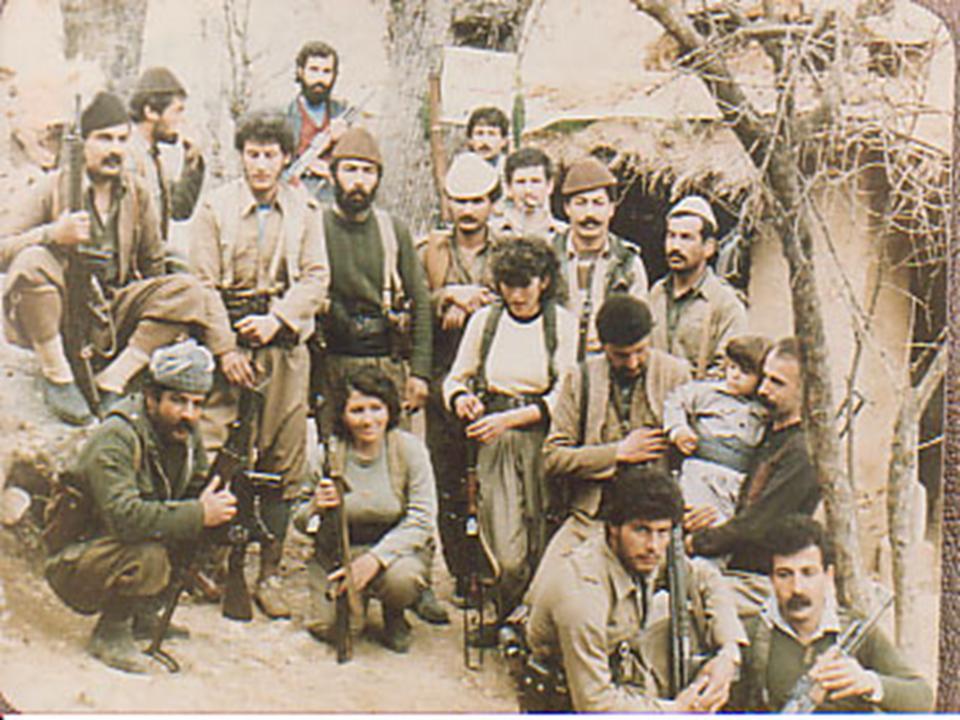 |
Fighters of the Assyrian Democratic Movement in the 1980s – Assyria (North of Iraq) |
“The Assyrian National Assembly” (ANA) established in 2004 in Baghdad, is asking for the recognition of the Assyrian people as indigenous ethnicity of Iraq and to return back all the confiscated lands by the Kurds, and promoting the Assyrian cause in Iraq and abroad.
And also we have many other organizations that are working but not unified yet because of many problems, we are all hoping that soon they will join together in a national conference to unify their voice in order to introduce the Assyrian cause in the international arena.
National Symbols
The Assyrian Flag: The Assyrian flag was decided as a symbol of the Assyrian nation in 1968 during the 1st conference of the AUA. The center of the Assyrian flag is a golden circle to represent the sun. The sun gives heat and light to sustain earth and all its living things. The light blue, four pointed star that surrounds the golden circle, represents the land, the color stands for tranquility. There are wavy stripes the stream outward from the golden center to the four corners. These stripes represent three major rivers, the Euphrates, the Tigris and Zab Rivers. The dark blue representing Euphrates, which symbolizes abundance. The red stripes represent Tigris, the blood red color standing for courage, pride and glory. The white between the stripes represents Zab River, the white stands for peace. The image of the Assyrian god Ashur is located above the blue star; this stands for him guarding the country, the flag and the nation that the flag represents. – The Assyrian flag is taken form the “Shamash” sign (the Sun God).
The Assyrian Winged Bull: We have statues known as “Assyrian Winged Bull” but the right name is “Lamasu” which is the correct name in Acadian (Old Assyrian) which meant “The Perfect Guard” for it signifies the power and wisdom: the head of a man means wisdom, eagle wings depict the most powerful creature in the sky (the eagle) and the wings on the statue symbolize the glory, the body of the statues were either of a bull (most common) or of a lion, this shows the power and strength of Assyria. The statue also had five legs which when viewed from the front made it appear to stand firmly in place but when viewed from the side it appeared to be striding forward. We have many other monuments scattered just like their owners, and preserved by the world museums, and thousands of them have been stolen after the allied forces entered Baghdad in April/2003, someday we will get them back by any mean and we have all the right to ask for them, because we own them.
National Days
S O L D |
|
, Realtor600 E. Main St. #300
Turlock, CA 95380 |
|
| www.listwithtony.com |
The Assyrian Martyrs Day: Assyrian people took pride in what they believed in. In recent years, we no longer have a country to call our own, but we do have our language and our traditions. At one time we were given a choice, change our Christian religion and Assyrian identity or die. Unfortunately many died. Mothers saw their children dying with their own eyes. We didn't give up our religion nor our culture and identity. Today we have Remembrance Day on August 7th which has been designated Memorial Day for Assyrian Martyrs through the history. Although this is a rather recent date, it is widely accepted among the Assyrian people. Every nation needs to have a day for the remembrance of those who gave their lives for their cultural and ethnic identity. This is especially important for Assyrians, as no other people have given so many martyrs in the defense of their religious and ethnic rights.
Each time an Assyrian man, woman, or child stood up against their enemies and refused to give up their religion or language, our nation as a whole was pulled back from extinction! Even if the consequences of their actions were death. Our martyrs are the essence of our history. They defended our existence, giving up their own lives, so that we would be encouraged to preserve our culture for future generations.
Remembrance Day was meant to honor the massacres of Assyrians through the centuries. We have realized that there have been many examples in our history, which equaled or surpassed the importance of that specific date. Therefore, the current practice of honoring all martyrs on the 7th of August is important and beneficial. Each of our churches has memorials for their own particular saints and martyrs. The 7th of August should be a Memorial Day for all of these martyrs, so that we can bring the children of this nation together to honor those people and events.
When we think of martyrs we often mourn them and the events of their lives. We feel bitterness, and despair at their suffering. In the light of their sacrifices, we must develop understanding and focus on preserving the values for which they gave their lives. The swords and guns of our oppressors cannot kill our culture or our love of our nation. Instead they strengthen our attachment. There is only one thing, which can destroy our cultural, and that is the division of our own people. We have always to dedicate ourselves to preserving our culture, language, and national feelings. And we must always honor our martyrs’ memory in the most suitable way by protecting the very values for which they sacrificed their souls. We will never forget them; they are our ultimate guide for our salvation.
The Assyrian New Year: “Neesan” is Assyrian New Year; before Christ it was celebrated on 19-21 March for 12 days. All Assyrians of Nineveh and Babylon used to come to their great cities and pray to the great God Marduk. That day is special to us and we still celebrate it every year in huge numbers.
The Assyrian year starts in the equinox day (The equinox is the date when the Day equals to the night, which means exactly 12 hours day, and 12 hours night), which is not stable because it comes between 19 and 21 of March. Assyrians were the only civilization who discovered this day (The Equinox) and they discovered that nature changes starting from that date, and that date was the beginning of spring we call it Neesan but later after Christianity the Romans changed the calendar and unfortunately all the world is following them including US the Assyrians.
And many other peoples neighboring the Assyrians took the Assyrian culture and religion for the oneness of God was taken from the Assyrians who worshipped the mighty God of today, who was known as “Ashur”, and “Mardukh” in Babylon.
 |
Assyrians in North Iraq celebrating the New Year |
Customs
The Bride of the Ascension: Assyrians have a special day called Kalu D’Sulaqa, which comes 40 days after the Easter; because Jesus remained for 40 days on earth and was seen by many people before He was taken back to his heavenly Kingdom to sit at the right hand of his father God. In the springs we have a celebration for the ascension of Jesus; People come from all around to picnic in a big park. Some families try to get there as early as 4 o'clock in the morning, so they can get the best place for themselves. People bring lots of food and games. Little girls wear brides’ dresses, and have a basket to go around the park so that people will give them candy. They have a band with drums and clarinets so that everyone can dance, everyone makes a tunnel with their hands and one by one they take turns dancing through it.
Nusardel Day: This day comes 59 days after “Sulaqa” this day is a remembrance of the Assyrian god “Dumuzi” when he rise up from the dead and people should accept him after washing themselves from sins, it’s a kind of baptism before the coming of Jesus. In this day people sprinkle each other by water; they bring spray guns and anything to throw water with. People come from all around to picnic in a big park. Some families try to get there as early as 4 o'clock in the morning, so they can get the best place for themselves. People bring lots of food and. They have a band with drums and clarinets so that everyone can dance, that day it doesn't matter if you are a stranger or not, they will get you wet!
Shara: Every saint has a special remembrance day called “Shara”, in Shara everyone enjoys praying, than eating and People brings the drum and clarinet so people can dance, they bring a lamb and make wishes and donations. People like mixing the soup when the soup is boiling so that their wishes will come true. When you go to Shara and eat the food “Doukhrana” (the remembrance of a saint), you will say to those people “Alaha Kabelleh”, which means “may God accept it”. This is a tradition that was started before Jesus was crucified for our sins. When they put Jesus on the cross and He died for our sins this Dukhrana was no longer practiced, but we still like to do this because we consider that the bodies of those Saints of the church of the East after Christ, were a sacrifice (Dukhrana) for the whole Christianity too.
Assyrian Traditional Clothes: Never have we forgotten our customs and our language. Here are some of them. Our clothing style has changed, but some aspects remain unchanged. At one time we all dressed in Julih d' Khomala. That means clothes for the dance troops celebrating weddings. Then we changed our clothing, but the Tyaraeh, one of the five largest Assyrian tribes still wear them at special events like weddings. Women wore thick dresses and the men wore lots of layers of cloth. This was because when there was war they wouldn't get cold. The women wore lots of jewels wrapped their heads in black fabric called Pusheeya. Before Julih d' Khomala we had different types of clothing but Julih d' Khomala is more popular and is still worn today in some Assyrian villages. We used the drum and clarinet. Today Assyrians have stereos and cassettes to use, but we still use the drums and clarinets for special days.
Wedding Tradition: We have special customs for weddings, Before a wedding, the guy tells his parents about the girl that he loves, his Parents would go to the girl's house to Notify her parents by saying: "please hold your daughter for our son". His mother gives the girl a necklace. Everybody takes a date and all the relatives go to her house, this day is important. His family will wear a girl with ornaments and sing special songs and everybody will have a turn with the girl wear with ornaments. The grooms' family comes and visits the bride and they bring gifts and sweets to her every Sunday. On the day of the wedding, the grooms' family comes to take the bride from her home. They bring a drum and clarinet players and gifts of flowers and sweets for the bride. The family of the groom taking an item from the bride's house is a very old Assyrian tradition and it is practiced only by Assyrians in the world, I think it symbolize the lose of their daughter that is being taken from the house. The groom’s people are taking this item because she will leave and go live with her husband they all dance and sing and then the groom gets to take his bride, but when he gets to the door, the brother of the bride is there and will not let his sister go without a gift of money or gold. It is to show respect and honor to the bride and her family. The story is told however, that the littlest child of the bride's family is the one that does not want to let his sister go, so to distract the little one they give him money to go buy candy or ice cream. We still do this tradition today, but you know it can sometimes cost a lot of money.
Some people wear Assyrian clothing. Everyone waits in the door for the groom and bride to enter the hall. Everyone dances and moves, they wave their hands and special decorated veils. They all make funny sounds with their mouths, and the groom sits with the bride while people dance the “Khigga Yaqura” (The heavy dance). They also start a chain of dancers that hold each others hands. The first person puts one of their hands behind their back and the person behind them holds onto it. We use a cane decorated with beads and flowers and dance around. Everyone moves their legs and shoulders up and down. We have many dances, Khigga d'Sharra is a dance that means war, and the symbols in it are fighting between Assyrians and the enemies.
Assyrians move their shoulders enthusiastically while dancing as a significance of the courage and readiness and ability to fight with the enemies at any time, another tradition at our weddings is for the guests to try to sit in the seat of the bride or groom, who should pay money to the person in their seat to get their seat back.
After a couple's honeymoon the both parts’ parents invite both the couple for a lunch, and sometimes the bride doesn’t eat lunch as a until the groom’s parents will give the couple a present as a welcoming, and then the bride start eating.
Christmas Fast: Twenty-five days before Christmas co then pay money to the person in their seat to get their seat back. Assyrian people fast, the only thing they eat are vegetarian food. On Christmas day, everyone goes to church. People go to the oldest family members’ house first. Everyday people go visit family and friends.
Epiphany Day (Bedennkha): In our culture, on the sixth day of January every year, we take the holy cross out of water. In Assyrian, we call it Eda-D'Bedenkha, and in English this day is called the Epiphany is for Jesus' baptism. This day people go to church. They write down their names and they give money to help the church. Then a child picks a name from the box and that person gets to take the Holy Cross home for one year. We believe this is a blessing. Then the next year we do it all over again and a new person gets to be the lucky one.
The Rogation of Ninevites: We have a special fast for 3 days, during this fast we don’t eat and drink anything, we even don’t drink water, as a remembrance to Jonah’s story according to the Old Testament, when he goes to the capital city of the Assyrians and preach there to make them return to God as mentioned, and finally they fasted for 3 days.
Good Friday and Easter: Good Friday is a sad day for Assyrians; People go to visit graves with flowers. This day we don't listen to music or watch television. Easter for our people is similar to our Christmas. We only eat vegetarian food for fifty days. People go to oldest families home, and everyone visits family and friends. Assyrian children take pretty eggs home. They have a game where people try to break each other’s eggs for fun; if your egg breaks I can take your eggs and eat them all. Assyrian people wait on Red Sunday for their happy Easter. Red Sunday is when Jesus rises up from the dead.
Gayyasa rituals: Every Monday following Easter, Assyrians use to remember their dead people and they named this day by “Gayyasa” (In Neo-Assyrian), which means “a bandit”, referring to the both bandits that were crucified with Jesus because the Jews and Romans wanted to insult our lord by punishing him with bad people. And before Jesus die, one of those “Gayyaseh” asked him to save him and his friend and himself if he is really the Christ (Lukas: 23:39), but the other bandit told him that they both (he and his friend) deserved the punishment unlike Jesus who is innocent (Lukas: 23:41), than he asked Jesus to accept him in his heavenly kingdom (Lukas: 23:42) so Jesus told him “Today you’ll be with me in Paradise” (Lukas: 23:43). And this bandit’s name was “Titus”. The Assyrians celebrate this in a symbolic method, considering that Jesus gave Titus a password to the heaven, and this password was “Cross”, so when Titus died, he was trying to enter the Paradise but the angel guard stopped him and asked about the password, so Titus said “Cross”, so the angel accepted him immediately, and that’s why Assyrians mention their dead people and act this story in the church praying for their dead people to enter the Paradise, just like Titus who was forgiven by Jesus.
Funeral Rituals:
The funeral in the Assyrian tradition defers than other people, and this ritual continues for 3 days as the following:
In the first day, the clergy prays to bless a water that the body should be washed by, and this pray is called “Burakh Miyya” (Water Blessing), then volunteers would take this water to the dead house and wash it’s body, and than the priest prays a special prayer from a book called “Taqsa D’Aannideh” (Prayers for the dead), and then the body would be taken to the church were special prayers and hymns will be recited, and then the body will be taken to the cemetery where the priest will pray the “Khutama” and will mark a cross on the cemetery, from up to down then left to right. Then everybody come back to the house of the dead and the priest again will pray on a water then this water will be sprinkled on the bed where that person died, and everybody washes his hands to get purified from the filthiness of death, then they eat something blessed by the priest as a holy Eucharist for the mercy to the dead person’s soul, and this Eucharist is known in Assyrian language as “Gulitha”.
The Second day, a prayer begins at noon (12:00 O’clock) and another Eucharist is done in the church hall or in the house of the dead person, today this day is celebrated only in the villages in the Assyrian homeland.
The Third Day, volunteers (only women) wake up early and take blessed water and incense and candles, and then they make fire near the cemetery and perfume it with incense, and then friends and parents go to the cemetery too and sprinkle the blessed water on the cemetery, and this act signifies the perfuming of Jesus’ cemetery by the Nard perfume after 3 days of his death, then the priest prays the final prayer, and this time he’ll mark a cross on the cemetery from Down to Up, then from Right to left, unlike he marked it in the first day (See above), and this means that the soul has ascended to the paradise, and finally all return to the church where they will make the last Eucharist and pray to the God to rest his soul in peace.
 |
Someday the Assyrian nation will resurrect to take its place again in this world. |
Conclusion
Today there are some Assyrians not practicing their rituals as before because they are scattered in Diaspora where they live in cities with foreign people and this influenced on the Assyrian culture, and today Assyrians have a well-established media and political organizations that are still trying to preserve the Assyrian existence in the homeland despite the spiteful surrounding societies.
So we still have hope and faith in God and the Assyrian nationalism as well, and as long as the national feeling exists, we still have hope that someday the Assyrian flag will flap in our homeland Assyria when we’ll get our self determination rights. We would give anything so that we could once again have a country to call our own and establish again the Assyrian state to share in building this wonderful world beside other nations, and it’s the world obligation to preserve this indigenous ethnicity from disappearing. The world should recognize and help us, we don't have a country but we have a name, an identity and a history that is “Assyrian”, we are proud being Assyrian.
